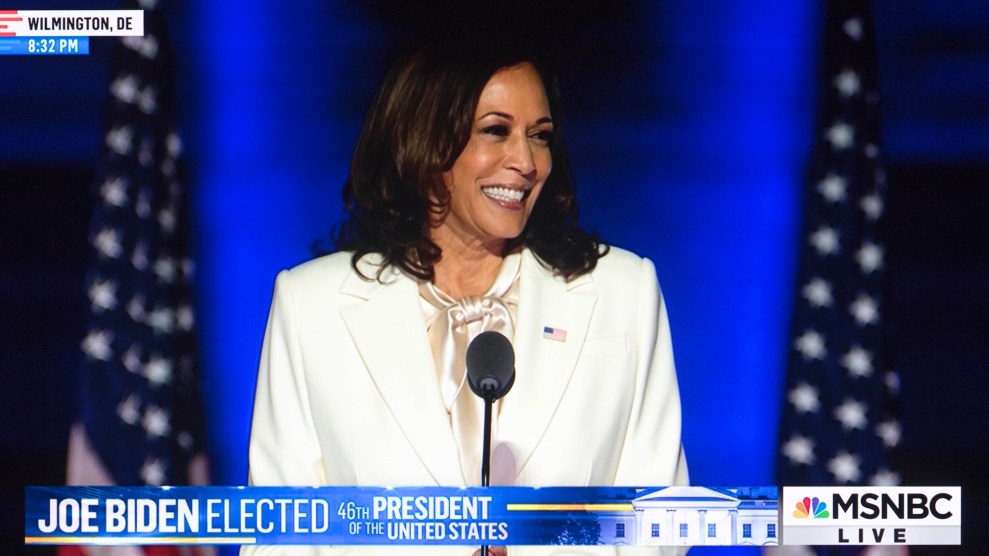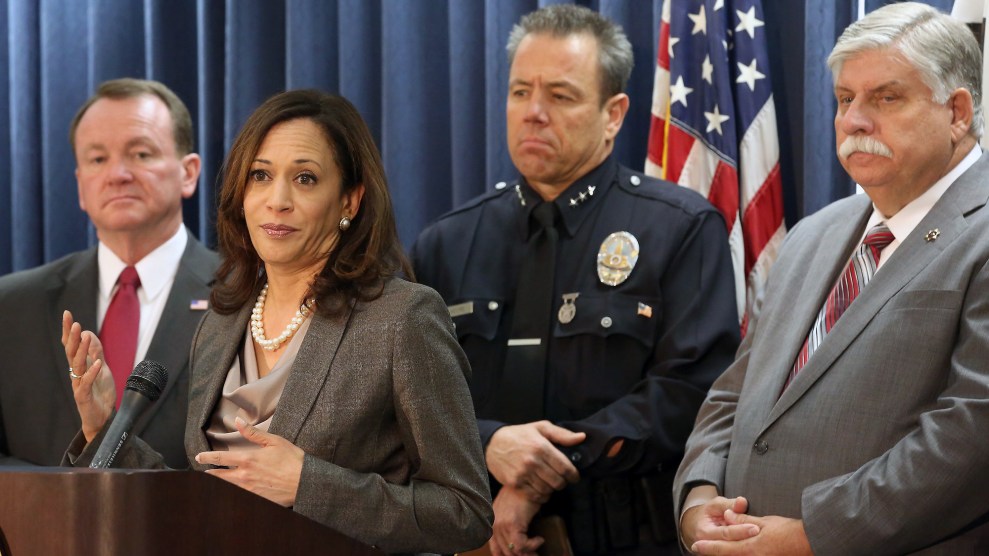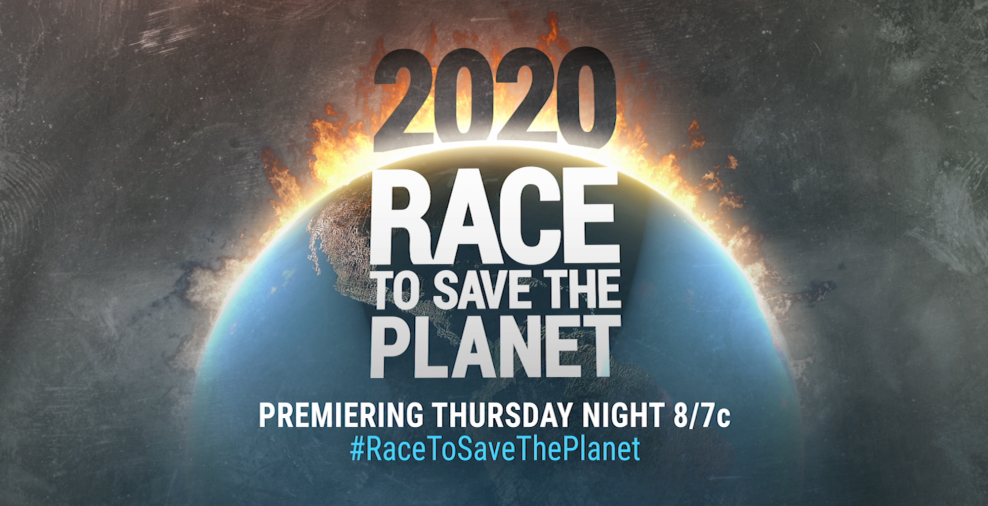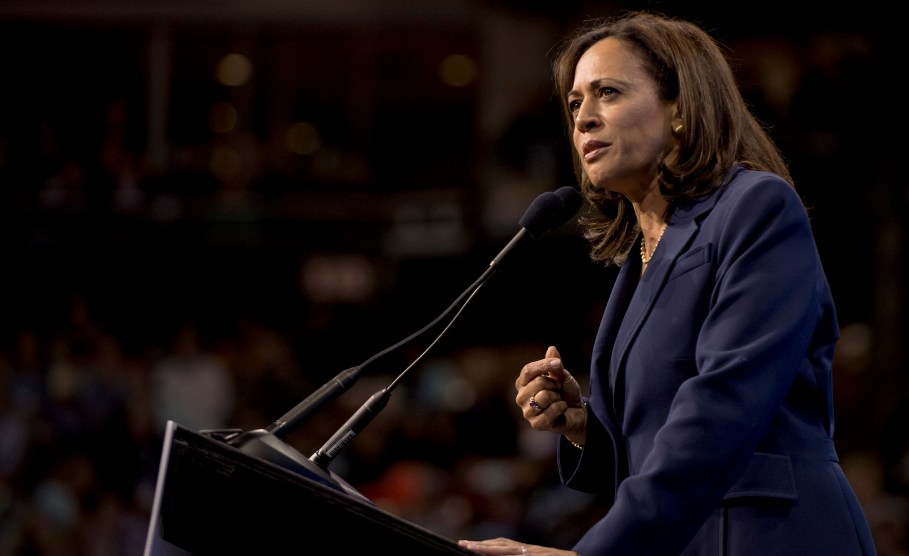
Mother Jones illustration; Lev Radin/Sipa/AP; Getty
When it comes to campaign messaging, Kamala Harris’ past as a prosecutor has served as both a strength and a liability. As a first-term senator from California, her rigorous cross-examination during the confirmation hearings of several Trump appointees—including Attorney General Jeff Sessions, Supreme Court Justice Brett Kavanaugh, and Environmental Protection Agency Administrator Scott Pruitt—raised her profile and put her on the political map.
At the same time, during her bid for the 2020 Democratic nomination for president, criminal justice advocates criticized her prosecutorial past. Memes declaring “Kamala is a cop” circulated on social media and were picked up by bad-faith detractors who Harris saw as attempting to “distort” her record. Throughout her campaign, she struggled to reframe her résumé until, finally, she shut down operations in late 2019.
But all that changed last month, shortly after President Joe Biden dropped his reelection campaign and endorsed her as his heir apparent. At that point, the vice president wasted no time leaning into the “prosecutor” label she earned as a lawyer in the courtroom, district attorney, and California’s attorney general to position herself in opposition to the former president, GOP presidential candidate, and convicted felon Donald Trump, who last May was found guilty on 34 counts related to hush-money payments to porn actor Stormy Daniels.
“I took on perpetrators of all kinds—predators who abused women, fraudsters who ripped off consumers, cheaters who broke the rules for their own gain,” Harris told supporters in Wilmington, Delaware. “So, hear me when I say: I know Donald Trump’s type.”
His “type,” notably, included climate sellouts. She described that during her stint as district attorney, she created “one of the first environmental justice units in our nation” to prosecute polluters. “Donald Trump stood in Mar-a-Lago,” she continued, “and told Big Oil lobbyists he would do their bidding for a $1 billion campaign contribution.” She, Harris argued, was the anti-Trump.
It was a noticeable shift in tone from just five years ago, when Harris fought to stand out in a crowded Democratic primary. Of the more than 20 candidates vying to take on Trump in 2020, including Harris, most supported achieving net-zero carbon emissions, a carbon tax, and the newly introduced Green New Deal, a resolution to slash greenhouse gas emissions that has yet to pass in a divided Congress.
“Let’s get them not only in the pocketbook, but let’s make sure there are severe and serious penalties for their behaviors.”
At the time, with no climate debate on the books, Harris joined Mother Jones, the Weather Channel, and Climate Desk for a series of conversations with 2020 Democratic presidential hopefuls that became part of a one-hour Weather Channel special, “2020: Race to Save the Planet.” She said that she planned to use the Department of Justice to prosecute “crime[s] against the environment” and go after fossil fuel polluters. “Let’s get them not only in the pocketbook,” Harris said at the time, “but let’s make sure there are severe and serious penalties for their behaviors.” (The Harris campaign did not respond to a request for comment about whether this is still part of her platform, or what “serious penalties” meant, specifically.)
As my former colleague Rebecca Leber wrote in 2019, when Harris was head of California’s Department of Justice, she did indeed sue major oil and gas companies. But the environmental justice unit at the San Francisco DA’s office—one of the first in the country, Harris often notes—might not have been all that she claimed it to be. As Grist reported last month, under Harris’ leadership, the unit prosecuted some companies including U-Haul for unlawfully disposing of hazardous waste, among other charges, and brought a few lawsuits against low-level offenders. In terms of the major polluters in the region, her office reportedly failed to pursue them.
As vice president, however, she served in the most climate-forward administration to date. In 2021, the White House announced plans to target at least a 50 percent reduction in greenhouse gas emissions by 2030 compared to 2005 levels, part of the country’s commitments under the Paris Agreement, which former President Donald Trump famously backed out of during his tenure.
In 2022, Harris cast the tie-breaking vote to pass the Inflation Reduction Act, the largest investment in fighting climate change ever passed by Congress. And, as Grist noted, Harris represented the Biden administration at 2023’s COP28 in Dubai, where she promised a $3 billion commitment to the Green Climate Fund to support developing countries in the fight against climate change. The administration’s list of climate achievements is so long, Harris said in March at a conference of climate activists, that her husband, Doug Emhoff, jokingly describes it as a “CVS receipt.” “We could just go on and on,” she said. As of this week, more than 350 environmental justice advocates and politicians—including former presidential climate envoy John Kerry, former Secretary of State Hillary Clinton, and former White House climate adviser Gina McCarthy—have signed a letter endorsing Harris.
Now, with Trump as her primary opponent, Harris’ prosecutor brand might land differently. “In 2020, her past made it hard for her to break through,” my colleague Jamilah King wrote in early July. But now, “it could be exactly what’s needed.” On climate change, Trump has vowed to undo much of the Inflation Reduction Act and use fossil fuels, which he described as the “liquid gold” just sitting “under our feet,” and promised to “drill, baby drill.” When asked on the debate stage last June whether he’d take “any action” to slow the climate crisis, he dodged. If Harris is the anti-Trump, her momentum among environmental voters could suggest that a climate prosecutor might be exactly what they’re looking for.
















